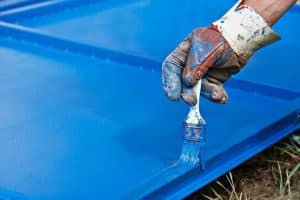
The metal coatings industry is dominated by large corporations that provide a wide selection of outstanding paints but may be too rigid to cater to special application needs. Every coating application has specific parameters, but if the coating does not work properly straight out of the drum, the end user is out of luck. At Cortec, the company says customers adapt the right coating to their individualized needs.
Finding the right Cortec coating
When a customer comes to Cortec looking for a corrosion-inhibiting paint, Cortec will first help them narrow down the best option available from Cortec’s existing portfolio. Some of the parameters Cortec examines alongside customers are as follows:
• Coating carrier (water-based vs. solvent-based)
• VOCs
• Coating thickness
• Outdoor vs. indoor use
• Salt spray performance
Based on the information provided, Cortec’s representatives and technical staff can then recommend one or two coatings that seem best suited to the job. Sometimes, no modification is needed at all. Other times, a trial run may reveal that slight customization is due.
Coatings customization
Reasons for coating customization fall into two categories: performance and application needs. The former includes factors such as adhesion and salt spray requirements, which may be higher or lower than the specific coating in the lineup. Cortec can work with customers to adjust these parameters in special situations.
On the other side of the coin, the customer’s application process can be a huge gamechanger—not because of something wrong with the coating but because different application methods affect the same coating differently.
For example, the use of an airless sprayer versus the dip coating process means viscosity may need to be adjusted to make the coating flow more smoothly through the sprayer. Some application methods create extra foaming and therefore require foam control. In other situations, the manufacturer may need a longer or a shorter drying time. There are countless other considerations, as well, that may require small or large adjustments to the base coating. Cortec works to stay flexible and adapt to the customers’ needs, which sometimes leads to discoveries that can benefit others in the process.
Example 1: Speeding up Dry Time
This was the case with a manufacturer who needed an anticorrosion coating to protect the outer diameter (OD) of steel pipes from corrosion until commissioning by the end user. Manufacturer requirements were very rigorous, demanding protection at 1 mil DFT (dry film thickness) and compliance to stringent VOC standards.
In addition, the coating needed good hot hardness so the pipes would not stick together after force-drying. This also improved the automatic stenciling process. The quest to meet all these parameters led to the development of a coating in the Cortec portfolio: EcoShield 386 FD. This specialty formula showed excellent protection during a one-year trial on pipes sitting outside and even allowed the customer to reduce costs by using less paint. It also led to the discovery of a new coating with ideal characteristics for manufacturers handling hot parts on a fast-paced paint line.
Example 2: Slowing Down Dry Time
In another case, Cortec was called in to help a manufacturer of large HVAC systems find a coating solution that offered better protection than the previous paint that did not prevent rust from forming on the units. Cortec visited the manufacturer multiple times and discussed salt spray, adhesion, and a variety of other coating specifications with the client’s engineers and painters.
Ultimately, they settled on VpCI-375 and VpCI-386 as the protective primer/topcoat system, with special adjustments made to meet the customer’s paint specifications. Cortec did custom color matching and also adjusted the formula to slow down paint dry time so the customer could apply the coating wet-on-wet as desired. Ultimately, Cortec’s dedicated engagement in the process paid off in the form of a coating system that solved the corrosion problem while also reducing the number of primer coats and overall coatings thickness.
Finding corrosion solutions
Cortec is in the business of finding corrosion solutions that work for the customer. When it comes to coatings, sometimes that means making modifications to help the coating work in a specific application environment. While other companies may not be able to adapt to the customer’s specific needs, Cortec provides flexible support by focusing on finding a solution that works.
For more information, click here.
Contact Details
Related Glossary Terms
- hardness
hardness
Hardness is a measure of the resistance of a material to surface indentation or abrasion. There is no absolute scale for hardness. In order to express hardness quantitatively, each type of test has its own scale, which defines hardness. Indentation hardness obtained through static methods is measured by Brinell, Rockwell, Vickers and Knoop tests. Hardness without indentation is measured by a dynamic method, known as the Scleroscope test.
- outer diameter ( OD)
outer diameter ( OD)
Dimension that defines the exterior diameter of a cylindrical or round part. See ID, inner diameter.







